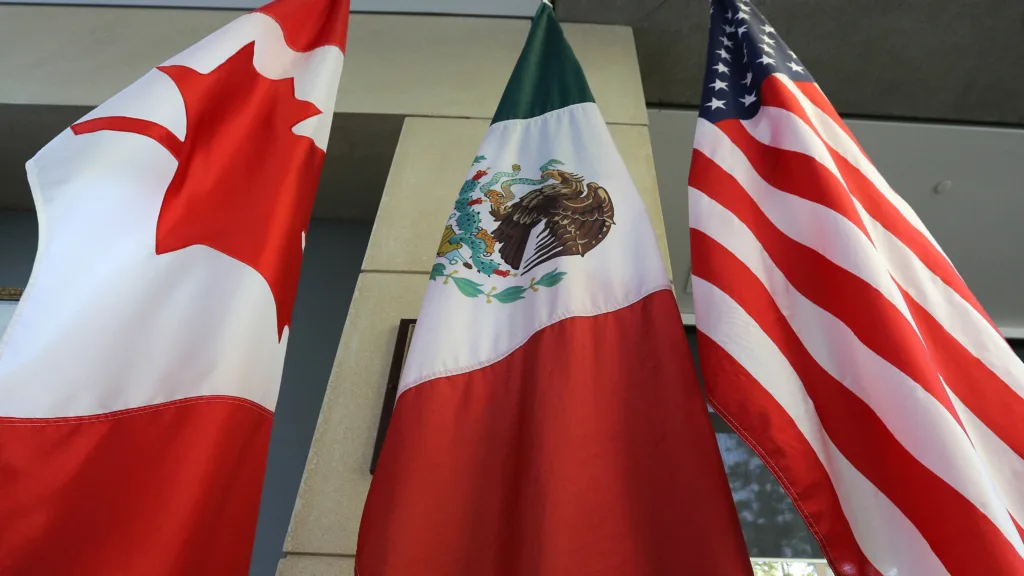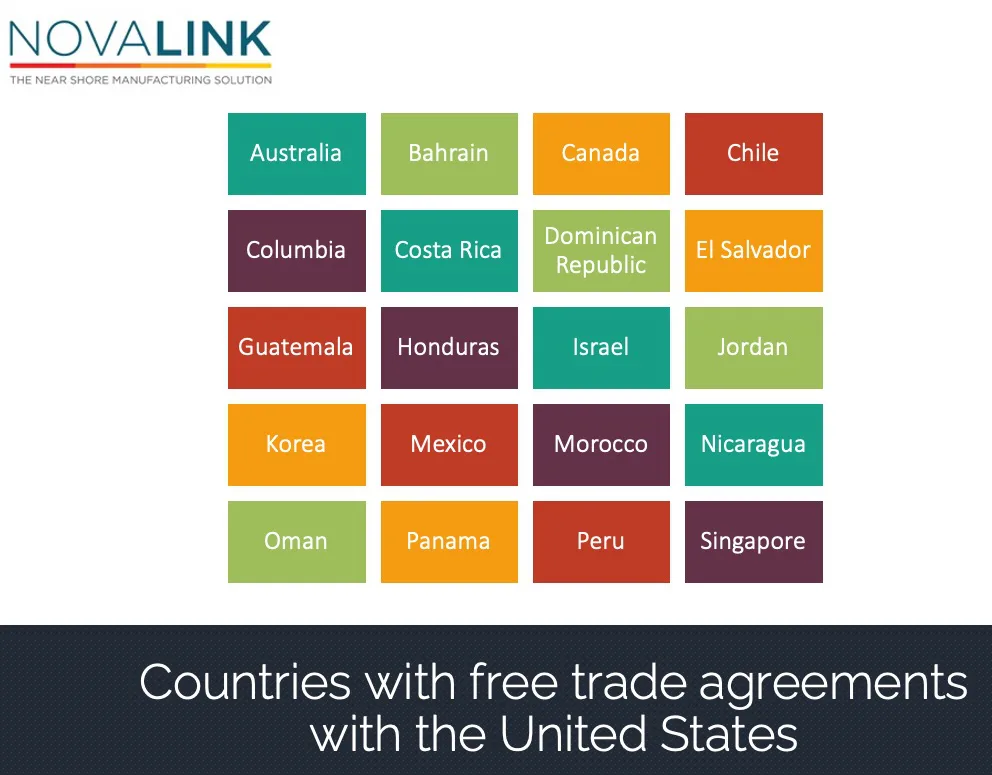Last Updated on September 7, 2023
The American consumer market offers more choices of goods, often at competitive prices, than ever before. American consumers have access to a wide array of goods, such as clothing, electronics, furniture, and automobiles, both in retail stores and online. Where does this abundance of goods come from? The benefits of free trade agreements.
However, delving deeper reveals their immense importance, not just for individual nations but for the global economy as a whole. This article will explore the significance of free trade agreements, with a particular focus on the enduring partnership between the United States and Mexico.

What is a Free Trade Agreement?
A Free trade Agreement (FTA) is an agreement between two or more countries where the countries agree on certain obligations that affect trade in goods and services, and protections for investors and intellectual property rights, among other topics. For the United States, the main goal of trade agreements is to reduce barriers to U.S. exports, protect U.S. interests competing abroad, and enhance the rule of law in the FTA partner country or countries.
International Trade Association
These agreements are designed to stimulate economic growth, enhance market access, and strengthen diplomatic ties. They come in various forms, including bilateral and multilateral agreements.
Boosting Economic Prosperity
One of the primary reasons why free trade agreements are crucial is their role in fostering economic prosperity. By removing tariffs and other trade barriers, countries open up new markets for their goods and services. This increased access can lead to significant economic growth, as businesses can expand their customer base and increase their exports.
For example, the United States-Mexico-Canada Agreement (USMCA), which replaced the North American Free Trade Agreement (NAFTA), has been instrumental in facilitating trade between the United States and Mexico. This agreement has led to increased exports of American goods to Mexico, benefitting various industries, including automotive, agriculture, and technology.
Strengthening Diplomatic Relations
Beyond economic benefits, free trade agreements play a vital role in strengthening diplomatic relations between nations. These agreements require cooperation, negotiation, and compromise, fostering a sense of trust and partnership among signatory countries.
In the case of the United States and Mexico, the USMCA is a testament to the enduring friendship and cooperation between these neighbors. It serves as a platform for addressing not only trade-related issues but also broader topics like immigration, security, and environmental concerns.
"Canada and Mexico are the top two export destinations for U.S. small and medium-size enterprises, more than 120,000 of which sell their goods and services in our two North American neighbors. When an American small business starts exporting, it’s almost always to Canada or Mexico."
USMCA Coalition
Promoting Innovation and Competition
Competition is a driving force behind innovation and efficiency. Free trade agreements expose domestic industries to international competition, compelling them to improve their products and services to remain competitive.
The US-Mexico trade relationship has seen this dynamic in action, with industries on both sides of the border constantly innovating to meet market demands. This leads to better products for consumers and drives economic growth.
What Nations Does the United States Have a Free Trade Agreement With?

No Free Trade Agreement with China
“The United States and China have several unresolved issues surrounding the bilateral trade between the two countries. The trade deficit between China and the U.S. has swelled immensely as the volume of imports from China grew much more rapidly than U.S. exports to China. This large trade deficit has been an issue of concern for economists and policymakers alike. Some claim it as an indicator of Chinese unfair trade practices, while others credit the imbalance to the strength of the Chinese economy and production systems heavily influenced by state interventions. The Trump administration initiated several tariff measures with a goal of reducing the trade imbalance.”
Library of Congress
As reported by The New York Times, the Biden administration is not in a hurry to change tariffs with China or examine an FTA with the country.
“The Biden administration said it would not immediately remove the Trump administration’s tariffs and would require that Beijing uphold its trade commitments.”
New York Times
Business Benefits From Trading With Free Trade Partners Such as Mexico and Canada
Because the USMCA gives preference to Canada and Mexico, it is beneficial for US businesses to trade with these nations (and others with Free Trade Agreements). As a result of free trade with Canada and Mexico, there are also additional benefits that are not found in trade with other nations:
- As a result of the U.S.-Mexico-Canada agreement (USMCA), the United States, Canada and Mexico now have the largest free trade area in the world with 454 million people.
- About 13 million Americans are employed as a result of trade with Canada and Mexico.
- An increase in cross-border trade and investment: From 1993 to 2019, trade between the three members quadrupled from $290 billion to $1.23 trillion.
"Integrated North American supply chains could provide a viable alternative to Chinese manufacturing and allow some critical industries to move production closer to home.”
Brookings Institute
Encouraging Foreign Direct Investment (FDI)
Free trade agreements also encourage foreign direct investment (FDI). When businesses see that a country has favorable trade conditions and access to a larger market, they are more likely to invest in that country. This influx of FDI can create jobs, boost economic development, and improve infrastructure.
Mexico, in particular, has seen a surge in FDI thanks to its participation in free trade agreements. Its strategic location and access to both North American and global markets make it an attractive destination for foreign investors.
Conclusion: Free Trade Agreements Offer Many Benefits to Businesses
Doing business with a country that has a free trade agreement with the United States has numerous benefits. Due to free trade agreements, the United States and its trading partners can trade and invest more efficiently and integrate their economies. To stay competitive, innovative, and economically leading in North America, we use free trade agreements to strengthen our supply chains.
If you are an American business looking to sell goods overseas, it is preferable to begin your business venture in countries with U.S. free trade agreements rather than trying to break into a country such as China.
Frequently Asked Questions on Free Trade Agreements
1. What is the USMCA, and how does it differ from NAFTA?
The USMCA, or United States-Mexico-Canada Agreement, is a trade deal that replaced NAFTA. While it retains many of the provisions of NAFTA, it includes updated rules on various industries, such as automotive and agriculture, and has stronger labor and environmental standards.
2. How has the USMCA benefited the automotive industry in the United States and Mexico?
The USMCA has increased the regional content requirement for automobiles, encouraging more production within North America. This has led to job growth and investment in both countries' automotive sectors.
3. What other countries has Mexico entered into free trade agreements with?
Mexico has an extensive network of free trade agreements, including deals with countries in Latin America, Europe, and Asia. Notable agreements include those with the European Union, Japan, and Brazil.
4. How do free trade agreements affect consumer prices?
Free trade agreements often lead to lower consumer prices by promoting competition and reducing tariffs on imported goods. This can benefit consumers by providing access to a wider range of affordable products.
5. Are there any downsides to free trade agreements?
While free trade agreements offer numerous benefits, they can also face criticism for potentially negatively impacting certain industries or workers. However, these agreements are typically designed to balance such concerns with broader economic and diplomatic objectives.
About NovaLink
As a manufacturer in Mexico, NovaLink employs a unique approach that transcends the traditional model of shelter production. More than just the location of your manufacturing, we would like to become a partner in your manufacturing in Mexico. You will be able to relocate or initiate manufacturing for your company in Mexico in a low-cost labor environment with very little delay or up-front costs. Find out how we can help you by handling the manufacturing process.
There are NovaLink facilities in the border cities of Brownsville, Texas, Matamoros, Mexico, and Saltillo, Mexico.